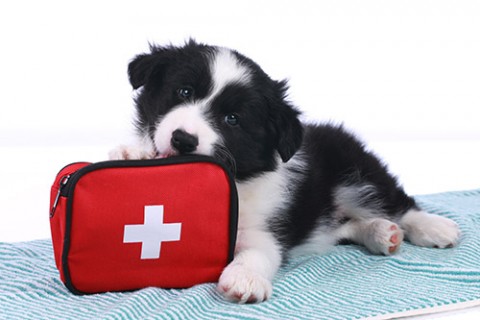Nothing is more terrifying for pet parents than experiencing an emergency with their beloved pet. In fact, during emergency situations with my own pets, I need to gain my composure, calm down, and go back to my training. Emergencies are scary and stressful for everyone, even the most trained and prepared people. I am a firm believer in preparing for pet emergencies before they happen, which can help pet parents avoid the immediate panic that sets in. After reading this article, you should be able to put together your own “Pet’s First Aid Kid,” and you will have more confidence and comfort if you ever experience an emergency with your pet at home. Let’s get started!

The first thing that I always stress to pet parents is to contact your veterinarian immediately with any pet emergency. First-aid is not a substitute for veterinary care; however, it may save your pet's life until you can reach your veterinarian. Any first aid administered to your pet should be followed by immediate veterinary care.
Your pet first aid kit
Your Pet First Aid Kit should include:
- Absorbent gauze pads
- Adhesive tape
- Blanket
- Cotton balls or swabs
- Flashlight
- Gauze rolls
- Ice pack
- Leash
- Muzzle (don't use this if your pet is vomiting, choking, or in respiratory distress)
- Non-latex disposable gloves
- Plastic eyedropper or syringe
- Petroleum jelly
- Pet carrier
- Rectal thermometer (your pet's temperature should not rise above 103°F or fall below 100°F)
- Scissors
- Self-cling bandage
- Sterile non-stick gauze pads for bandages
- Sterile saline solution
- Splints and tongue depressors
- Tweezers
- Towels
Pet emergency contact list
It is important to have any necessary contact information at your fingertips for dealing with a pet emergency. Even if you have memorized these numbers, in times of distress much of what we know is difficult to remember. Your list should include:
- Contact information for your pet’s veterinarian.
- Contact information and driving directions for the nearest 24-hour emergency veterinary hospital.
- Contact information for the poison control center or hotline.
- An emergency contact. Either a loved one or friend who may be able to help during an emergency.
Pet emergency paperwork
It is always helpful to know your pet’s latest vaccination status, and keep appropriate medical records. Many times, in a state of emergency, it is hard to remember everything you need. If your pet’s paperwork is easily accessible in your Pet First Aid Kit, this will be helpful for your veterinarian for immediate treatment in an emergency. The records should include:
- Vaccination status
- Medical history of past illnesses
- Current illnesses
- A photo I/D of your pet
Pet emergency medications
Keeping some medications in your Pet’s First Aid Kit can be helpful in emergency situations, but it is important to consult with your veterinarian regarding the appropriate dosing and whether these medications are safe or indicated for your pet:
- Benadryl (Diphenhydramine)- your veterinarian must tell you the correct dose before administering this medication
- Glucose paste or corn syrup (for diabetic dogs or small breed puppies with low blood sugar)- speak with your veterinarian before administering glucose paste or corn syrup to your pet
- Non-prescription antibiotic ointment
- Antiseptic wipes, lotion, powder or spray
- Valium (for pets that have seizures)- your veterinarian must tell you the correct dose before administering this medication
- Hydrogen peroxide (3%) (helpful to induce vomiting)- please speak with your veterinarian or local poison control center before inducing vomiting or treating an animal for poison or a swallowed object
I hope this helps everyone be a little more prepared and less panicked in case of a pet emergency. Having the essentials to deal with an emergency will help you feel more secure and ready to care for your beloved pet. Please update your Pet First Aid Kit every 6 months to make sure you have everything you need, and medications are not expired. And remember to keep the kit out of the reach of children. Keeping our pets safe and healthy is always my top priority.
If you have any questions or concerns, you should always visit or call your veterinarian. They are your best resource to ensure the health and well-being of your pets.
